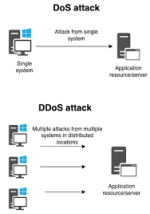Hello to all of you.
My server has been having security issues lately, and I think there may be a denial of service attack on it.
But I'm attempting to determine if it's a more straightforward Denial of Service (DoS) attack or a Distributed Denial of Service (DDoS). Is there a way to rapidly determine the type of attack such as this?
How can a DDoS with several sources be distinguished from a DoS with just one source? I would also be grateful for any guidance on what to do at first when you detect unexpected traffic!
Regards.
My server has been having security issues lately, and I think there may be a denial of service attack on it.
But I'm attempting to determine if it's a more straightforward Denial of Service (DoS) attack or a Distributed Denial of Service (DDoS). Is there a way to rapidly determine the type of attack such as this?
How can a DDoS with several sources be distinguished from a DoS with just one source? I would also be grateful for any guidance on what to do at first when you detect unexpected traffic!
Regards.





